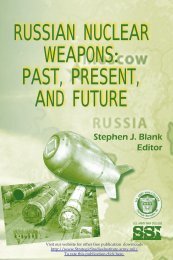The United States and China in Power Transition - Strategic Studies ...
The United States and China in Power Transition - Strategic Studies ...
The United States and China in Power Transition - Strategic Studies ...
You also want an ePaper? Increase the reach of your titles
YUMPU automatically turns print PDFs into web optimized ePapers that Google loves.
Wash<strong>in</strong>gton <strong>and</strong> they will lobby the U.S. Government<br />
to put pressure on <strong>Ch<strong>in</strong>a</strong>.<br />
<strong>The</strong> Ch<strong>in</strong>ese are very concerned with the “U.S. factor”<br />
<strong>in</strong> the X<strong>in</strong>jiang problem. <strong>The</strong>y note that s<strong>in</strong>ce the<br />
end of the Cold War, the <strong>United</strong> <strong>States</strong> has become<br />
the pr<strong>in</strong>cipal foreign power to <strong>in</strong>terfere with the X<strong>in</strong>jiang<br />
problem. <strong>The</strong>y all hold that, much like the Tibet<br />
issue, the <strong>United</strong> <strong>States</strong> uses the X<strong>in</strong>jiang problem to<br />
put pressure on <strong>Ch<strong>in</strong>a</strong>. Ch<strong>in</strong>ese analysts also see that<br />
the U.S. strategic design aga<strong>in</strong>st <strong>Ch<strong>in</strong>a</strong> <strong>in</strong> this area has<br />
not been affected by the War on Terrorism. <strong>The</strong>y believe<br />
that the <strong>United</strong> <strong>States</strong> has an <strong>in</strong>terest <strong>in</strong> keep<strong>in</strong>g<br />
<strong>Ch<strong>in</strong>a</strong>’s troubled areas unsettled <strong>and</strong> unstable so that<br />
the <strong>United</strong> <strong>States</strong> will have more strategic flexibility<br />
aga<strong>in</strong>st <strong>Ch<strong>in</strong>a</strong>.<br />
<strong>The</strong> Ch<strong>in</strong>ese are especially concerned with the U.S.<br />
Congress <strong>and</strong> some powerful nongovernmental organizations<br />
(NGOs) <strong>in</strong> their support for the Uyghur<br />
separatist organizations. <strong>The</strong>y have noted that Congress<br />
uses resolutions, although nonb<strong>in</strong>d<strong>in</strong>g, to put<br />
pressure on <strong>Ch<strong>in</strong>a</strong>. Congress also uses resolutions to<br />
force the President’s h<strong>and</strong>. Ch<strong>in</strong>ese analysts note that<br />
although other great powers such as Great Brita<strong>in</strong>,<br />
Germany, Russia, Japan, Turkey, <strong>and</strong> the Soviet Union<br />
supported Uyghur movements <strong>in</strong> the past, s<strong>in</strong>ce the<br />
end of the Cold War, the <strong>United</strong> <strong>States</strong> has become<br />
the pr<strong>in</strong>cipal foreign power to support the Uyghurs.<br />
Ch<strong>in</strong>ese analysts have documented Uyghur activists’<br />
meet<strong>in</strong>gs with President Bill Cl<strong>in</strong>ton <strong>and</strong> Vice President<br />
Al Gore <strong>and</strong> U.S. Government <strong>and</strong> NGO support<br />
to the WUC. <strong>The</strong>y provide funds <strong>and</strong> moral support<br />
<strong>and</strong> put pressure on the Ch<strong>in</strong>ese government. 198<br />
172

















